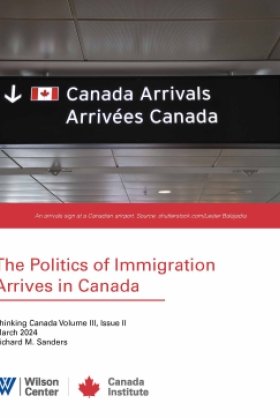New Book Discussion -- <i>Driven Out: The Forgotten War Against Chinese Americans</i>
Overview
Jean Pfaelzer, Professor of American Studies and English, University of Delaware, author; commentators Janelle Wong, Associate Professor of Political Science and American Studies and Ethnicity, University of Southern California, and Wilson Center Fellow; Franklin Odo, Director, Smithsonian Asian Pacific American Program. Co-sponsored by the Wilson Center's Asia Program.
Chinese immigrants came to the western part of the United States in large numbers in the second half of the 19th century. They were primarily men, arriving to work in the gold fields of California. By the last decades of the century they found themselves facing not only harassment and violence but expulsion from cities such as Seattle and Denver, along with numerous towns. There were over 200 purges in California alone. Jean Pfaelzer described this largely overlooked story in American history at a discussion of Driven Out, organized by the Division of United States Studies with the cooperation of the Center's Asia Program.
The Chinese were not the first foreign group to arrive in the United States for the purpose of mining gold, and they were not the first targeted for violence by white residents. The techniques used to drive them out, which included exorbitant taxes and other restrictive local regulations as well as violence, had been used earlier against other immigrant groups such as the Chileans, Argentineans, Peruvians and Mexicans. The Chinese were eventually forced to move to small towns and cities in states such as Oregon and California, finding work in laundering, fishing, restaurants, and other parts of the service sector.
The Chinese viewed themselves as new Americans. The white residents of these towns and cities, however, considered them interlopers who lacked American values and who came to the United States for the purpose of sending money back to China, and employed various methods to drive them out. The anti-Chinese acts were both private and public. The Chinese were "starved out" of Truckee, California in 1869, for example, by a ten-week economic boycott of their businesses by white citizens and merchants. In 1871, sixteen Chinese men and one Chinese woman were lynched during a riot in the Chinatown of Los Angeles. By the 1870s and 1880s, Democratic politicians from the defeated southern states had moved West and had taken over leadership positions in many of the Western states, bringing their racist beliefs with them. Some towns ordered their Chinese populations to leave town by a certain deadline, as did Tacoma, Washington in November 1885.
The roundups were particularly devastating for Chinese women. Unlike the Chinese men, who volunteered to come to the United States, most of the Chinese women had been kidnapped from the port cities of Southern China or the city of Hong Kong and were brought to this country as enslaved prostitutes. Chinese prostitute-slaves lived for an average of only four years after they arrived in this country, as they were quickly killed by disease. Some of them managed to escape from their captors and settle in rural towns. For these women, the purging of Chinese from rural communities meant not only the loss of community but the possibility of being re-enslaved.
The story, however, was not only one of Chinese victimization but of Chinese action as well, with the Chinese finding ways to resist and protect themselves. They discovered that the Fourteenth Amendment's prohibition on depriving any persons (not only any citizens) of their life, liberty or property could be invoked on their behalf. The Chinese community in San Jose, California obtained an injunction in 1871 to stop police harassment. In 1886, the Chinese community of Eureka, California sued the city for reparations for their lost property and for being forced out of the city during the February, 1885 mob attack on their community. Over 100,000 Chinese Americans refused to carry the photo-identification cards that were required by the federal Geary Act of 1892. In Humboldt, California, a town that alleged that it had no Chinese residents, several Chinese men who were working in the canning industry in 1906 refused to be driven out until they received their pay for the season.
Commentator Franklin Odo praised Pfaelzer for expanding Asian-American studies to include larger issues of race, labor and class. In particular, her work shows the collaboration of working class organizations and business interests in anti-Asian activities. There has not been sufficient research about Asian Americans on the West coast and in the mid-West, and Pfaelzer's book helps to fill the gap. Janelle Wong commented that the volume shows the value of a research methodology that draws on local news archives. Prof. Wong raised a number of questions still to be addressed by researchers. What aspects of the violence suffered by the Chinese, for example, was directed at them as Chinese, as opposed as part of a drive against all Asian-American groups? Did Asian-American groups cooperate across ethnic lines to fight such injustices, or distance themselves from one another? She noted that Asian Americans have been largely absent from immigration rights demonstrations today and asked what the reasons might be.
Prof. Pfaelzer, the discussants and the audience all commented on the striking parallels between the story of the Chinese in the United States in the 19th century and the national- and local-level policy discussions about immigration and immigrants that are taking place in this country today.
Drafted by Acacia Reed
Philippa Strum, Director, Division of U.S. Studies 202-691-4129
Robert Hathaway, Director, Asia Program 202-691-4012
Hosted By

Indo-Pacific Program
The Indo-Pacific Program promotes policy debate and intellectual discussions on US interests in the Asia-Pacific as well as political, economic, security, and social issues relating to the world’s most populous and economically dynamic region. Read more
Thank you for your interest in this event. Please send any feedback or questions to our Events staff.










